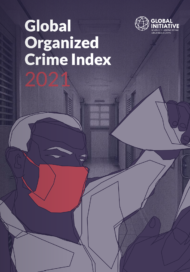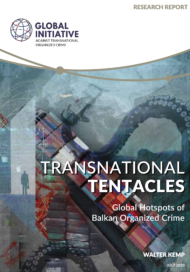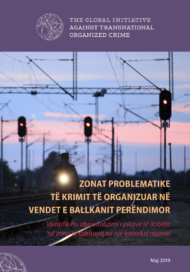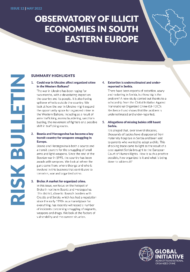Posted on 12 Jul 2022
In a meeting in Sofia on 14 July, participants highlighted lessons learned from Bulgaria’s efforts to fight organized crime and corruption and discussed potential disruptions to criminal markets in the Black Sea region due to the war in Ukraine.
Among the topics discussed in the meeting, co-organized by the Observatory of Illicit Economies in South-Eastern Europe of the Global Initiative Against Transnational Organized Crime (GI-TOC) and the Sofia-based Centre for the Study of Democracy, were lessons learned from Bulgaria’s three decades of coping with organized crime and the impact of EU accession on reducing criminality yet creating new opportunities for corruption. The meeting was attended by representatives of civil society, state institutions and embassies.
The GI-TOC presented the results of the Global Organized Crime Index for Bulgaria, emphasizing the country’s progress against organized crime, but noting its challenges to tackle grand corruption and abuse of power. ‘The Index shows that Bulgaria has relatively low criminality but also low resilience to cope with it, not least because of the poor environment in which civil society works in the country,’ said Kosyo Ivanov, a senior analyst at the GI-TOC.
Participants discussed how the war in Ukraine is influencing criminal markets in south-eastern Europe and the Black Sea region, particularly in relation to the smuggling of weapons and fuel, and the trafficking in firearms and human beings. ‘The Balkans region has experience in sanctions busting, and we should learn from the past,’ warned senior adviser to the GI-TOC Trpe Stojanovski. However, participants noted that increased attention to organized crime in the region due to the conflict could trigger closer law enforcement cooperation.
The GI-TOC also shared the main findings of a recent report on football hooligans, organized crime and politics in the Western Balkans, and of an upcoming report on smuggling through ports in south-eastern Europe. There were also presentations on organized corruption, typologies and characteristics of state capture, and efforts to strengthen integrity.
‘This meeting shows the importance of research and analysis on organized crime and using the findings to improve policy and operational responses,’ said Fatjona Mejdini, director of the GI-TOC’s Observatory of Illicit Economies in South-Eastern Europe. ‘Tackling transnational crime requires transborder cooperation, and we look forward to following up with civil society actors and government representatives in Bulgaria to strengthen networks and joint efforts to reduce the threat posed by organized crime in the country and the region.’
The meeting in Sofia followed a high-level conference in Sibenik, Croatia, in May, and is part of the GI-TOC’s efforts to widen its focus and activities from the Western Balkans to south-eastern Europe more broadly. ‘The great cooperation that we enjoyed with the Center for the Study of Democracy in co-organizing and co-hosting this meeting shows the power of partnership and opens doors for further cooperation,’ said Mejdini.



